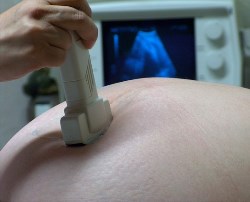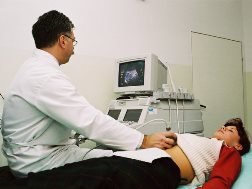How to Enroll in the Right Ultrasound Tech Training Program near Coyote New Mexico
 Once you have decided to pursue an ultrasound technician degree near Coyote NM, it’s time to begin the process of picking a school. First, you need to find the right program that will furnish the proper training to become a qualified professional. And given that some states do require that sonographers be either licensed or certified, depending on where you will practice you may also need to be prepared to pass a certification or licensing examination. So it’s very important that you investigate each program so that you can assess and compare your options. But exactly where does one start? Many students will start by looking for schools that are within driving distance of their homes and then by comparing tuition. Of course cost and location must be considered when arriving at a decision, but there are other important factors also. Such as, if the ultrasound technician schools have earned accreditation or if they offer internships. These and additional qualifications will be covered more in depth later in this article. But to start with, let’s discuss what a sonogram tech does and the degrees and online education programs that are available.
Once you have decided to pursue an ultrasound technician degree near Coyote NM, it’s time to begin the process of picking a school. First, you need to find the right program that will furnish the proper training to become a qualified professional. And given that some states do require that sonographers be either licensed or certified, depending on where you will practice you may also need to be prepared to pass a certification or licensing examination. So it’s very important that you investigate each program so that you can assess and compare your options. But exactly where does one start? Many students will start by looking for schools that are within driving distance of their homes and then by comparing tuition. Of course cost and location must be considered when arriving at a decision, but there are other important factors also. Such as, if the ultrasound technician schools have earned accreditation or if they offer internships. These and additional qualifications will be covered more in depth later in this article. But to start with, let’s discuss what a sonogram tech does and the degrees and online education programs that are available.
Click Here to Get Free Information on Ultrasound Technician Schools!
Sonographer Work Summary
 There are more than one professional titles for ultrasound techs (technicians). They are also called ultrasound technologists, sonogram techs, and diagnostic medical sonographers (or just sonographers). Regardless of name, they all have the same primary job function, which is to perform diagnostic ultrasound techniques on patients. Even though many practice as generalists there are specialties within the profession, for instance in cardiology and pediatrics. The majority practice in Coyote NM clinics, hospitals, private practices or outpatient diagnostic imaging centers. Standard daily job tasks of an ultrasound technician may involve:
There are more than one professional titles for ultrasound techs (technicians). They are also called ultrasound technologists, sonogram techs, and diagnostic medical sonographers (or just sonographers). Regardless of name, they all have the same primary job function, which is to perform diagnostic ultrasound techniques on patients. Even though many practice as generalists there are specialties within the profession, for instance in cardiology and pediatrics. The majority practice in Coyote NM clinics, hospitals, private practices or outpatient diagnostic imaging centers. Standard daily job tasks of an ultrasound technician may involve:
- Keeping records of patient medical histories and details of each procedure
- Counseling patients by explaining the procedures and answering questions
- Readying the ultrasound machines for testing and then sterilizing and re-calibrating them
- Transferring patients to treatment rooms and ensuring their comfort
- Utilizing equipment while limiting patient exposure to sound waves
- Evaluating results and identifying necessity for supplemental testing
Sonographers must routinely assess the performance and safety of their equipment. They also must adhere to a high professional standard and code of conduct as health practitioners. So as to sustain that degree of professionalism and stay up to date with medical knowledge, they are mandated to enroll in continuing education courses on a regular basis.
Ultrasound Tech Degree Programs Offered
 Sonogram technician students have the option to acquire either an Associate or a Bachelor’s Degree. An Associate Degree will normally take around 18 months to 2 years to accomplish based upon the program and class load. A Bachelor’s Degree will require more time at as long as 4 years to finish. Another option for those who have previously earned a college degree is a post graduate certificate program. If you have received a Bachelor’s Degree in any major or an Associate Degree in a related medical field, you can instead choose a certificate program that will take only 12 to 18 months to finish. Something to keep in mind is that the majority of sonographer programs do have a clinical training component as part of their course of study. It often may be satisfied by entering into an internship program which numerous colleges sponsor through Coyote NM clinics and hospitals. When you have graduated from one of the degree or certificate programs, you will then need to fulfill the licensing or certification prerequisites in New Mexico or whatever state you decide to work in.
Sonogram technician students have the option to acquire either an Associate or a Bachelor’s Degree. An Associate Degree will normally take around 18 months to 2 years to accomplish based upon the program and class load. A Bachelor’s Degree will require more time at as long as 4 years to finish. Another option for those who have previously earned a college degree is a post graduate certificate program. If you have received a Bachelor’s Degree in any major or an Associate Degree in a related medical field, you can instead choose a certificate program that will take only 12 to 18 months to finish. Something to keep in mind is that the majority of sonographer programs do have a clinical training component as part of their course of study. It often may be satisfied by entering into an internship program which numerous colleges sponsor through Coyote NM clinics and hospitals. When you have graduated from one of the degree or certificate programs, you will then need to fulfill the licensing or certification prerequisites in New Mexico or whatever state you decide to work in.
Sonographer Online Degrees
 As earlier discussed, nearly all ultrasound technician colleges have a clinical requirement to their programs. So although you can obtain a degree or certificate online, a substantial portion of the training will be either carried out in an on-campus lab or at an authorized off-campus medical care provider. Practical training can typically be satisfied through an internship at a local Coyote NM outpatient clinic, hospital or family practice. But the balance of the training and classes may be accessed online in your Coyote home. This is especially beneficial for those individuals that continue working while getting their degrees. Plus online colleges are frequently less expensive than on-campus alternatives. Costs for study materials and commuting can be decreased as well. But similarly as with every sonography college you are reviewing, make sure that the online school you ultimately pick is accredited. Among the most highly regarded accrediting organizations is the Commission on Accreditation of Allied Health Education Programs (CAAHEP). Accreditation is especially significant for licensing, certification and job placement (more on accreditation later). So if you are disciplined enough to learn outside of the classroom in the convenience of your own home, then online classes may be the ideal option for you.
As earlier discussed, nearly all ultrasound technician colleges have a clinical requirement to their programs. So although you can obtain a degree or certificate online, a substantial portion of the training will be either carried out in an on-campus lab or at an authorized off-campus medical care provider. Practical training can typically be satisfied through an internship at a local Coyote NM outpatient clinic, hospital or family practice. But the balance of the training and classes may be accessed online in your Coyote home. This is especially beneficial for those individuals that continue working while getting their degrees. Plus online colleges are frequently less expensive than on-campus alternatives. Costs for study materials and commuting can be decreased as well. But similarly as with every sonography college you are reviewing, make sure that the online school you ultimately pick is accredited. Among the most highly regarded accrediting organizations is the Commission on Accreditation of Allied Health Education Programs (CAAHEP). Accreditation is especially significant for licensing, certification and job placement (more on accreditation later). So if you are disciplined enough to learn outside of the classroom in the convenience of your own home, then online classes may be the ideal option for you.
What to Ask Ultrasound Technician Colleges
 After you have determined which degree or certificate that you would like to earn, you can begin the process of reviewing and comparing sonogram technician colleges. You may first want to decide whether you will attend classes online or commute to a school campus in the Coyote NM area. Obviously location will be critical if you decide on the latter, and the cost of tuition no doubt will be an important qualification also. But there are other variables that you should also take into account, for instance if the programs are accredited and if they provide internship programs. So in order to carry out your due diligence so that you can arrive at your final selection, below are a few questions that you need ask each ultrasound tech college prior to making a decision.
After you have determined which degree or certificate that you would like to earn, you can begin the process of reviewing and comparing sonogram technician colleges. You may first want to decide whether you will attend classes online or commute to a school campus in the Coyote NM area. Obviously location will be critical if you decide on the latter, and the cost of tuition no doubt will be an important qualification also. But there are other variables that you should also take into account, for instance if the programs are accredited and if they provide internship programs. So in order to carry out your due diligence so that you can arrive at your final selection, below are a few questions that you need ask each ultrasound tech college prior to making a decision.
Are the Sonogram Tech Colleges Accredited? A large number of ultrasound technician colleges have acquired some form of accreditation, whether regional or national. Even so, it’s still important to confirm that the school and program are accredited. Among the most highly respected accrediting agencies in the field of sonography is the Joint Review Committee on Education in Diagnostic Medical Sonography (JRC-DMS). Schools obtaining accreditation from the JRC-DMS have undergone a detailed evaluation of their teachers and educational materials. If the college is online it might also obtain accreditation from the Distance Education and Training Council, which focuses on distance or online education. All accrediting organizations should be recognized by the U.S. Department of Education or the Council on Higher Education Accreditation. In addition to guaranteeing a premium education, accreditation will also assist in obtaining financial assistance and student loans, which are frequently not accessible for non-accredited programs. Accreditation might also be a pre-requisite for licensing and certification as required. And a number of Coyote NM employers will only hire a graduate of an accredited program for entry level openings.
Are Internships Sponsored? Inquire if the sonogram technician schools you are reviewing have relationships with Coyote NM clinics or hospitals for internship programs. Internships are not only a great manner to receive hands on training in a clinical setting, they are also a way to fulfill the clinical training requirement for most programs. As a secondary benefit, they can help graduates and students establish professional connections in the Coyote medical community and assist with job placement.
Is Job Placement Assistance available? You will most likely want to hit the ground running after graduation, but getting that initial job in a new field can be challenging without support. Find out if the sonographer programs you are considering have job placement programs and what their success rates are. High and rapid placement rates are an excellent indication that the schools have large networks and good relationships with New Mexico healthcare employers. It also substantiates that their graduates are highly regarded and in demand.
Where is the College Located? For a number of students, the college they decide on will need to be within driving distance of their Coyote NM residence. Students who have decided to attend online classes naturally will not have to worry themselves with the location of the campus. However, the availability of area internships will be of concern. One thing to keep in mind is that if you decide to enroll in a school that is out of state or perhaps out of your local area, you might be required to pay a higher tuition. State colleges often charge higher tuitions for out of state residents. And community colleges commonly charge a higher tuition to those students that don’t reside within their districts.
What are the Class Sizes ? Unless you are the kind of person that likes to sit way in the rear of the classroom or hide in the crowd, you will likely want a smaller class size. Small classes enable more individual participation and personalized instruction. Ask the colleges you are looking at what the average teacher to student ratio is for their classes. If practical you may want to monitor one or more classes before making your final decision. This will also give you an opportunity to speak with several of the instructors and students to get their perspectives regarding the ultrasound tech program also.
Can the Program Accommodate your Schedule? And last you need to verify that the sonographer college you ultimately pick can provide the class schedule you need. This is particularly essential if you decide to continue working while you attend school. If you need to schedule night or weekend classes in the Coyote NM area, verify that they are offered. If you can only enroll on a part-time basis, verify if that is an option and how many credit hours or courses you would have to enroll in. Also, learn what the protocol is for making up any classes that you might miss because of work, illness or family emergencies.
Sonographer Ultrasound Technician Colleges Coyote New Mexico
 Selecting the right ultrasound tech degree or certificate program is a crucial first step to starting a rewarding new career furnishing diagnostic services to patients. Sonographer schools require that you have earned a high school diploma or equivalent. Along with meeting academic standards, you must be in at least reasonably good physical condition, able to stand for extended durations and able to regularly lift weights of fifty pounds or more, as is it typically necessary to adjust patients and move heavy machines. Additional beneficial skills include technical proficiency, the ability to stay calm when faced with an anxious or angry patient and the ability to communicate in a clear and compassionate manner. You originally came to this website due to an interest in Sonographer Ultrasound Technician Colleges and wanting more information on Sonographer Education. However, as we have discussed in this article, there are a number of questions that you need to ask each school you are looking at. This is the case whether you enroll in an online degree or drive to the school campus to attend classes. And by asking the right questions so that you can evaluate each program, you can narrow down your alternatives until you are left with the ideal program for your education. And with the right training, discipline and determination to succeed, you can realize your objective to practice as an sonographer in Coyote NM.
Selecting the right ultrasound tech degree or certificate program is a crucial first step to starting a rewarding new career furnishing diagnostic services to patients. Sonographer schools require that you have earned a high school diploma or equivalent. Along with meeting academic standards, you must be in at least reasonably good physical condition, able to stand for extended durations and able to regularly lift weights of fifty pounds or more, as is it typically necessary to adjust patients and move heavy machines. Additional beneficial skills include technical proficiency, the ability to stay calm when faced with an anxious or angry patient and the ability to communicate in a clear and compassionate manner. You originally came to this website due to an interest in Sonographer Ultrasound Technician Colleges and wanting more information on Sonographer Education. However, as we have discussed in this article, there are a number of questions that you need to ask each school you are looking at. This is the case whether you enroll in an online degree or drive to the school campus to attend classes. And by asking the right questions so that you can evaluate each program, you can narrow down your alternatives until you are left with the ideal program for your education. And with the right training, discipline and determination to succeed, you can realize your objective to practice as an sonographer in Coyote NM.
More Ultrasound Locations in New Mexico
Red wolf
The red wolf (Canis lupus rufus[6][7] or Canis rufus[4]) is a canine native to the southeastern United States. The subspecies is the product of ancient genetic admixture between the gray wolf and the coyote,[8][9] however it is regarded as unique and therefore worthy of conservation.[10]Morphologically it is intermediate between the coyote and gray wolf, and is of a reddish, tawny color.[11][12] The US Endangered Species Act of 1973 currently does not provide protection for endangered admixed individuals and researchers argue that these should warrant full protection under the Act.[8][10] However, the red wolf when considered as a species is listed as an endangered species under this Act and is protected by law.[13] Although Canis rufus is not listed in the CITES Appendices of endangered species,[2] since 1996 the IUCN has listed it as a critically endangered species.[2]
Red wolves were originally distributed throughout the eastern United States from the Atlantic Ocean to central Texas, and in the north from the Ohio River Valley, northern Pennsylvania and southern New York south to the Gulf of Mexico.[14] The red wolf was nearly driven to extinction by the mid-1900s due to aggressive predator-control programs, habitat destruction, and extensive hybridization with coyotes. By the late 1960s, it occurred in small numbers in the Gulf Coast of western Louisiana and eastern Texas. Fourteen of these survivors were selected to be the founders of a captive-bred population, which was established in the Point Defiance Zoo and Aquarium between 1974 and 1980. After a successful experimental relocation to Bulls Island off the coast of South Carolina in 1978, the red wolf was declared extinct in the wild in 1980 to proceed with restoration efforts. In 1987, the captive animals were released into the Alligator River National Wildlife Refuge on the Albemarle Peninsula in North Carolina, with a second release, since reversed, taking place two years later in the Great Smoky Mountains National Park.[15] Of 63 red wolves released from 1987–1994,[16] the population rose to as many as 100–120 individuals in 2012, but has declined to 40 individuals in 2018.[17]
The red wolf's taxonomic status is the subject of ongoing debate.[14] In 1851 the naturalists John James Audubon and John Bachman recognized Canis lupus rufus in the southern and southeastern United States.[3] In 1937 the zoologist Edward Alphonso Goldman proposed this wolf to be a new species Canis rufus.[4] In 1967, the zoologists Barbara Lawrence and William H. Bossert rebutted Goldman's classification as being too heavily based on probable hybrid specimens.[18] In the third edition of Mammal Species of the World published in 2005, the mammalogist W. Christopher Wozencraft listed the red wolf as a hybrid of the gray wolf and the coyote, but due to its uncertain status compromised by recognizing it as a subspecies of the grey wolf Canis lupus rufus.[7] Since the early 1980s, genetic analysis has been used to debate whether the red wolf is a species or a wolf/coyote hybrid. Commencing in 2016, two studies using whole genome sequencing indicate that North American gray wolves and wolf-like canids were the result of ancient and complex gray wolf and coyote mixing,[8][9] with the red wolf possessing 60% coyote ancestry and 40% wolf ancestry.[9]
